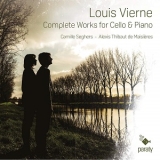Louis Vierne ist bekannt als einer der bedeutendsten französischen Organisten. Doch mit guten Kenntnissen der Streichinstrumente und des Klavierspiels komponierte Vierne auch Kammermusik, die hörenswert ist. Camille Seghers und Alexis Thibaut de Maisières spielen Viernes Gesamtwerk für Cello und Klavier, das auf eine CD passt.
Die Pablo Casals gewidmete Sonate für Violoncello und Klavier aus dem Jahr 1910 ist eines von Viernes Meisterwerken. Die Musik spiegelt die Gefühle von Trauer über seine rezente Scheidung ebenso wider wie die der inneren Revolte des Komponisten, dem gerade die Orgelklasse am Pariser Konservatorium entglitten war, der aber genug Kraft hatte, um auch seinen Lebens- und Siegeswillen auszudrücken. Den beiden Interpreten gelingt es sehr gut, nach dem leidenschaftlichen ersten Satz im Molto Largamente zu jener Ruhe zu finden, aus der das abschließende Risoluto seine Kraft bezieht. Nach den stimmungsvoll gespielten Zwei Stücken beschließt die 1928 komponierte Suite Soirs étrangers das Programm. Das Werk bringt Impressionen zum Ausdruck, die Vierne auf seinen Reisen gesammelt hatte. Die Musik ist sehr tonmalerisch, mitunter exotisch, aber nie anbiedernd, sondern immer stilvoll. Und genau so wird sie auch hier aufgeführt.
Der Pianist Alexis Thibaut de Maisières spielt bewundernswert vital, während die Cellistin Camille Seghers durch ein weiches und kantables Muszieren auffällt. Louis Vierne is known as one of the most important French organists. But with a good knowledge of string instruments and piano playing, Vierne also composed chamber music that is worth hearing.
Camille Seghers and Alexis Thibaut de Maisières play Vierne’s complete works for cello and piano, which fit on one CD.
Dedicated to Pablo Casals, the 1910 Sonata for Cello and Piano is one of Vierne’s masterpieces. The music reflects the feelings of grief over his recent divorce as well as those of the composer’s inner revolt, who had just lost his organ class at the Paris Conservatory, but who had enough strength to also express his will to live and win. The two performers succeed very well in finding, after the passionate first movement in the Molto Largamente, the calm from which the concluding Risoluto draws its power. After the atmospherically played Two Pieces, the program concludes with the Suite Soirs étrangers, composed in 1928. The work expresses impressions Vierne had collected on his travels. The music is very tone-painting, sometimes exotic, but never chumming up, always stylish. And that is exactly how it is performed here.
Pianist Alexis Thibaut de Maisières plays with admirable vitality, while cellist Camille Seghers stands out for her soft and cantabile music-making.






















